
The Life and Times of Hubert Brooks M.C. C.D.
A Canadian Hero

 |
|
 |
Monday December 15th 1947 was the date of the RCAF Flyers vs Army Headquarters hockey game
Ref: 8.5
at the Ottawa Auditorium.
The Army, still seething from their exclusion in the Olympic affair, poured everything into it – as they should of.
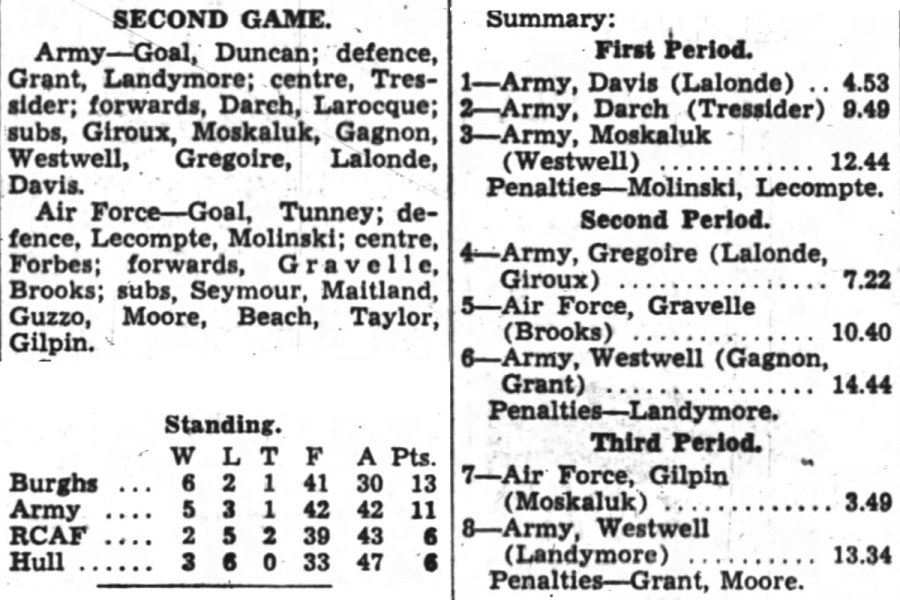
Final result: Army 6 and RCAF Flyers 2.
Bill Cowley's Army team chalked up their fourth straight victory in the Ottawa City League.
Although the game was hard fought throughout, clever passing plays, constant backchecking and a standout performance by Kenny Duncan in the nets for Army were key factors in their victory.
The Army's top line were able to successfully tie us up and prevent us from executing most of our set plays. This changed somewhat in the third period when we were able to hem the Army squad in their own end and press the action there. Army spent most of the period shooting the puck up ice.
In the second period, Orval Gravelle, who again had a good game, tipped in a shot I made on net to put the Flyers on the board. Andy Gilpin got the only other Flyer goal in the third period when our
pressing style finally paid off with a goal.
But it was too little too late. This was our second high profile loss in a row with the spotlight clearly on us.
This was not the Air Force's finest hour. The brass knew it. The CAHA knew it. The public knew it. And the press knew it.
Immediately following the game, Mr. Dawe had an "emergency meeting" with RCAF officials. The upshot was that drastic changes had to be made. The RCAF was to go ahead with whatever strengthening it could by auditioning new players and the CAHA was to dig up a couple of defensemen for the team. It was reported that Air Marshal Wilf Curtis, chief of the air staff, was not pleased!
The dream of bringing glory to Canada was crumbling.
And the reputation of the RCAF was suffering a humiliating blow.
Air Marshall W.A. Curtis, chief of air staff stated;
"I'm sick with disappointment.
We had such high hopes. There was such enthusiasm and such support.
The team is going to have to quickly strengthen itself immeasurably or it will have to be withdrawn.
This thing is bigger than the RCAF, bigger than the CAHA; it's as big as Canada's prestige at the Olympics.
I think we can still do it.
We haven't much time, but there must be some players of required ability available somewhere, and we will find them.
On Saturday the defence was deplorable. Why I could have run down the ice faster than some of the players skated."
After the loss to Army, Air Commodore Dave E. Mackell, deputy member for Air personnel stated;
"Guess we need a few more players to make a good team but we will not quit.
A couple of good defence players, about two good forwards and a strong goal tender will fix us."
Bill Cowley, coach of the Army team that beat the Flyers, normally a man of few words had the following to say;
"My club is not in good condition and may not have been so strong in the third period, but even at that any Olympic team should be beating us.
I could not figure out what hockey system or plays the Air Force were using. "
Boucher later stated:
"Sandy Watson's neck was really on the line now. So was mine. We really didn't have a lot of time left."
Several Press Announcements which followed best tell the story without too much emotion:
The (rare hockey) Editorial in the Ottawa Journal on 16 Dec 1947 summed up the "official sentiment":
"The folly of sending a hurriedly organized RCAF hockey team to the Olympic Games should have been obvious from the beginning.
Unscrambling this muddle is of national interest far beyond the limits of organized sports circles."
![]() Page 1 Headlines Thursday 18–Dec–47 Ottawa Citizen
Ref: 8.6
:
Page 1 Headlines Thursday 18–Dec–47 Ottawa Citizen
Ref: 8.6
:
NEW LINE for OLYMPIC PUCK SQUAD: BURGHS TO PROVIDE PLAYERS: Two Defensemen Also In View
The RCAF announced today that four players from the New Edinburgh entry in the Senior City Hockey League will be given
a tryout on Friday night....... The players, who compose a forward line with the Burghs are: Ted Hibbard, Reg Schroeder and Ab Renaud.
In addition Pete Leichnitz, center ice man, will be given a trial when the Flyers play against Belleville on Friday night.
The announcement added that two defensemen are being obtained, but their names have not been made known. The players mentioned
will be playing on Friday night on a trial basis only........
Decision to bolster the RCAF squad came after a city league game here this week in which the Army beat the Air Force 6 to 2. Previously
the Olympic Team had been whitewashed by McGill Redmen 7–0.
Norman Dawe, vice–president of the CAHA, scouted the Army–RCAF game for the sole purpose of deciding whether the
Air Force squad was good enough to represent Canada at the Olympics. After the game a conference was held between Mr. Dawe and Air Force
officials and it was decided that the Flyers would have to be bolstered considerably before they could adequately represent this country
at the Switzerland games.
Dec 18, 1947 In addition to the news that Pete Leichnitz, Ted Hibbard, Reg Schroeder and Ab Renaud were added to the squad
was the additional offsetting announcement that 6 players had been dropped from the team; Stan Molinski, Len Beatch, Tom Moore, Louis Bergeron, Dick Thomas and George Wilson.
![]() Extracts from Tommy Shield's Column in the Friday Dec 19th 1947 Ottawa Citizen Page 22 –
Extracts from Tommy Shield's Column in the Friday Dec 19th 1947 Ottawa Citizen Page 22 –
Hockey fans will follow with interest ......Going into action without delay, the officials concerned have added six players to the
Airmen's squad, at the same time cutting a like number from the roster. This is not a final move, however but a tentative change to
see what can be done to give the Flyers added strength.
In moving in the forward line from the New Edinburgh Club.... ..the Airmen get a three–man unit that should improve the team.
Reg Schroeder, Ted Hibbard, and Pete Leichnitz know each other's play and should be able to put some definite co–ordination
back into the Airmen's attack. If, Ab Renaud goes along as a fourth man, coach Frank Boucher will have four alternating
forwards, any three of whom should play well together. The addition of George Pumple and Frank Dunster should not hurt
the RCAF chances. The Airmen are in Belleville tonight for an exhibition game, and the contest may indicate just how much strength
has been added by the acquisition of the players previously mentioned. We hope that it is more than appears at first glance.
![]() FIVE BURGHS TRY FOR ICE BERTHS in the Friday Dec 19th 1947 Ottawa Citizen Page 22
Ref: 8.7
FIVE BURGHS TRY FOR ICE BERTHS in the Friday Dec 19th 1947 Ottawa Citizen Page 22
Ref: 8.7
Six players were cut from the roster and another half–dozen candidates were moved in on a strictly "trial" basis yesterday
as the remodeling of the RCAF Olympic hockey team got underway in earnest. Air Force authorities announced they are taking six
extra players – four forwards and two defensemen – to Belleville tonight for their exhibition game with Belleville
Intermediate OHA squad and hope the newcomers will lend some scoring punch and new defensive strength to Canada's Olympic hockey forces.
Five of the six newcomers are members of the Burghs.....Ted Hibbard, center; Reg Schroeder, left wing; and Ab Renaud, right wing; and
Pete Leichnitz, center; and Frank Dunster, a defenseman.
The sixth addition is a defense stalwart from St. Patrick's College Junior City Hockey League team, George Pumple.
In addition to the six newcomers previously mentioned the remaining players making the trip to Belleville are: Goalers Ross King and
Trev Williams, Defensemen Louis Lecompte, Jack Maitland and Jack Seymour, and Forwards Patzy Guzzo, Irving Taylor, Andy Gilpin, Orval
Graville, Hubert Brooks and Roy Forbes.
"This doesn't complete the re–modeling job," said an Air Force spokesman last night.
"We're trying out these six new fellows, are awaiting word from the CAHA and may have other changes to announce within a day or
so."
In the meantime other exhibition games are planned before the team sails Jan. 9th for Europe.
|
|

|
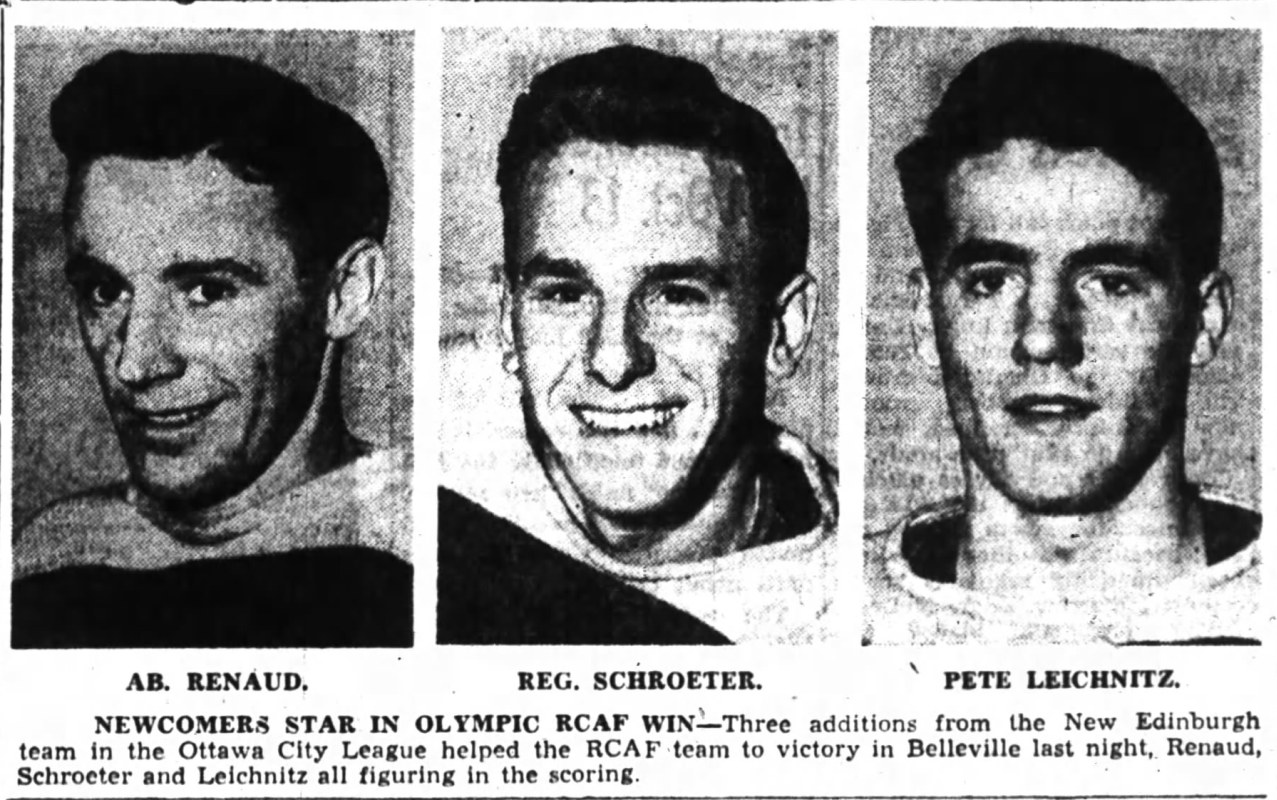
|
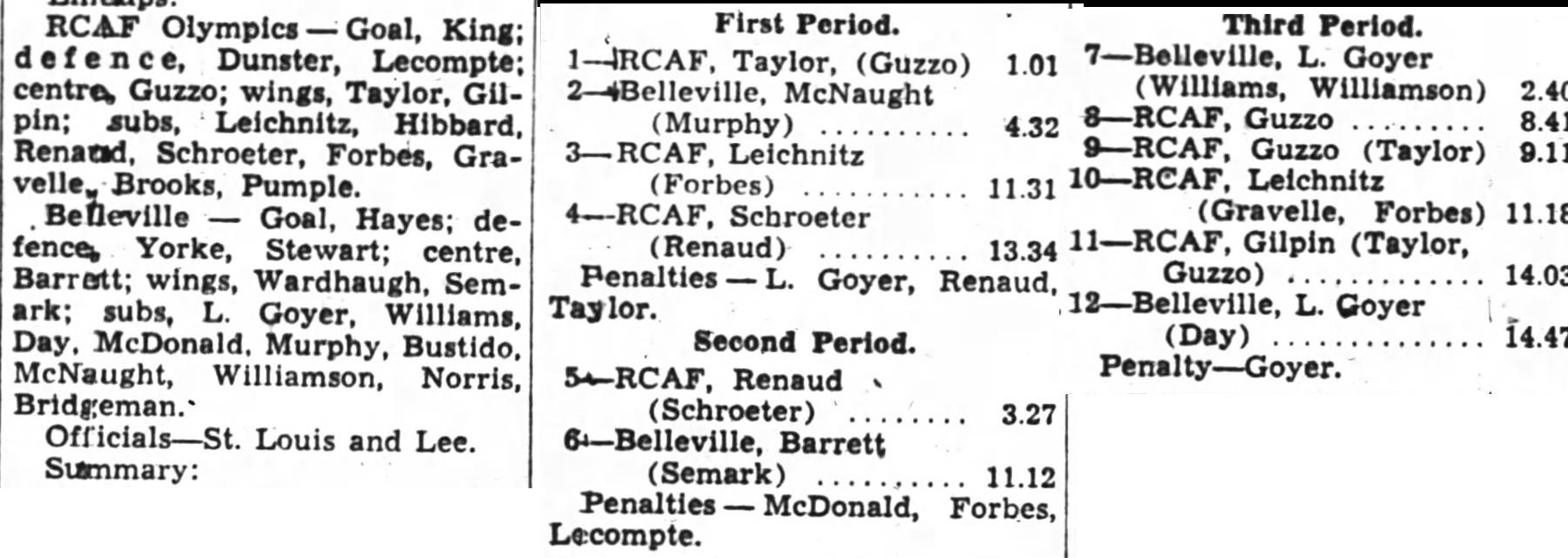
We won Friday's (December 19th, 1947) game in Belleville 8–4 against the
Belleville Intermediate Ontario Hockey Association squad so we were somewhat pleased with
ourselves. You could see that there was a lot more interaction and team work – perhaps since we had a few games under our belt
as a team and the new Burghs line knew each other's moves. Ross King had a good game in nets.
We were still not loose and definitely had more work to do.
The newspapers commented ; "that our squad still did not look like world-beaters and had the Belleville goalie been a bit sharper in the last period the score would have been a lot closer".
Coach Boucher re–enforced this view re–iterating that
further changes could still occur.
The CAHA still had not been forthcoming with any defensemen candidates as promised the previous week following the loss to Army.
![]() The Dec 23rd, 1947 Ottawa Citizen carried a news article that said
Ref: 8.8
:
The Dec 23rd, 1947 Ottawa Citizen carried a news article that said
Ref: 8.8
:
"The Citizen has learned, unofficially, that the folks guiding the Air Force team figure that the lack of strength back of
the blue line is not confined to the defense. The Olympic team could use a stronger goal–tender and in this connection, the name
of Fred Murphy, under–study to "Legs" Fraser of the Quebec Senior League has been mentioned. (Murphy has also played a
few games in nets for the Burghs)."
Obviously this drew the attention of our defense and goalie players.
For the next week or so we had daily practices at the Auditorium. We were progressively gelling into a team. The local newspapers kept reminding us that no word had been received yet from the CAHA regarding re–enforcements.
|
|
Amidst this turmoil, a story broke which brought no Christmas cheer to the team and our backers. On Christmas Eve 1947,
Al Pickard, president of the CAHA, admitted he had considered withdrawing the civilian bolstered Flyers from Olympic competition, but
said that exhibition game commitments overseas had already been made and would have to be honoured.
![]() The Ottawa Journal warned:
The Ottawa Journal warned:
"At best Sgt Frank Boucher, coach of the RCAF Flyers, has been given an intermediate team which should not be asked to play any exhibition
games against any senior team in Canada."
It was about this time that I made the cover of the Legionary monthly magazine that the Canadian Legion published. (The Legionary, No 6, Vol XXIII, December, 1947 Ref: 8.9 ) It was flattering however with the dynamics going on with the team I wished in a way that it hadn't didn't gone to press when it did. I knew I was frankly on the bubble in making the team. Being away from the game during the war, I had lost some of my timing and my stamina wasn't on par with a lot of the guys who stayed in Canada and played the game day–in–day–out. I was getting better day by day but there was a gap for sure with some of our elite players.

|
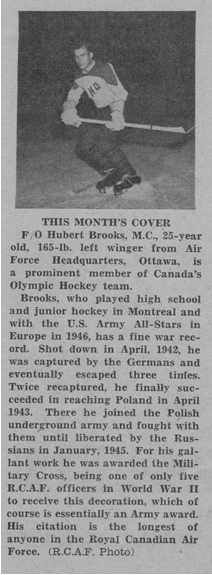
|
TIMELINE: Dec 29,1947; my birthday; 12 days before our departure to Europe from New York City on the Queen Elizabeth ocean liner.
|
|

|
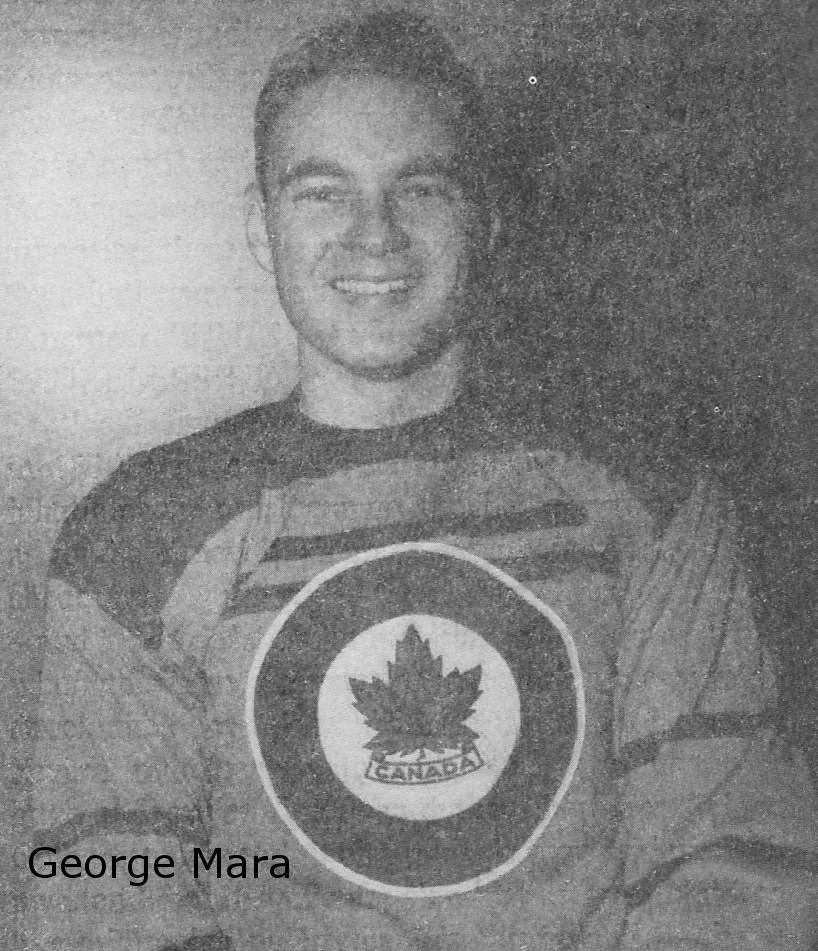
|
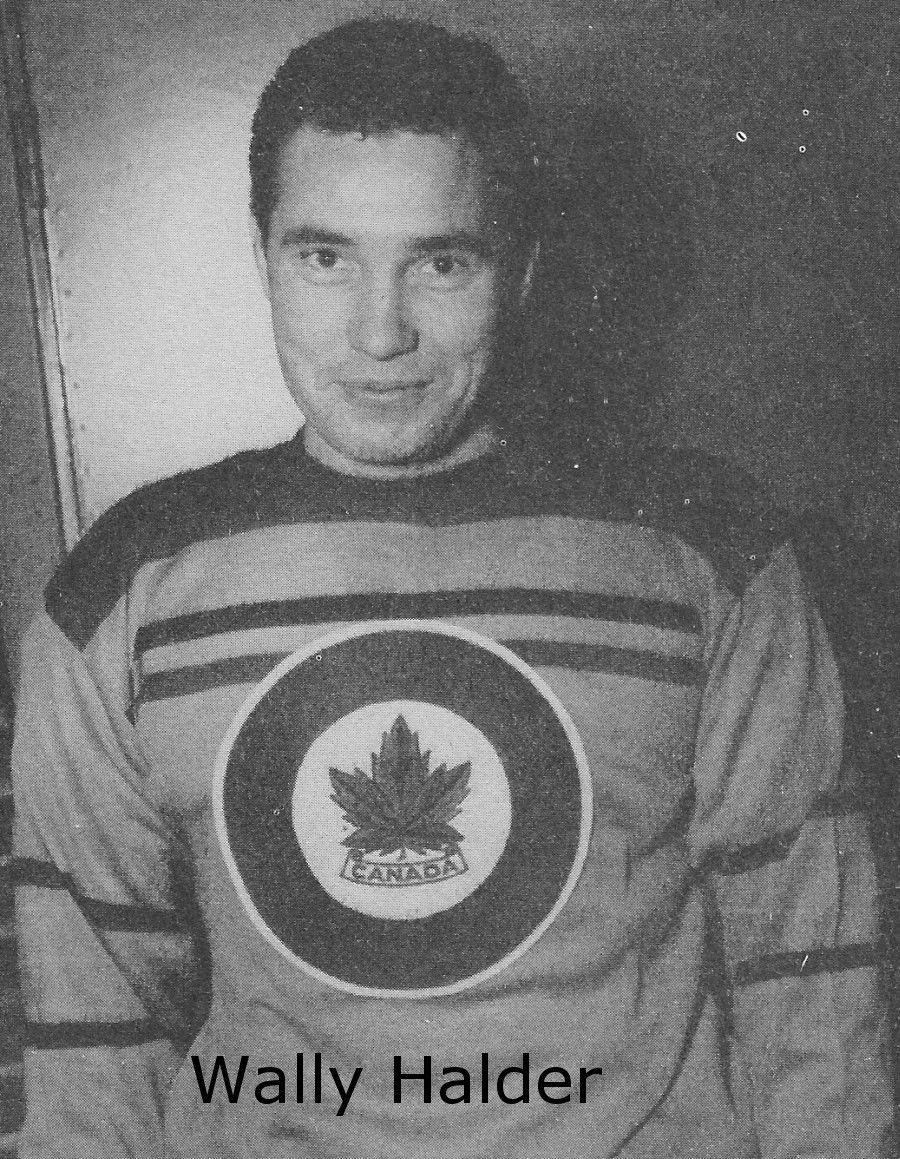
|

|
On December 29, 1947 we had a practice at the Auditorium. At that time we had 21 players in camp vying for the 17 spots. The newly arrived New Edinburgh forward line of Reg Schroeter, Ab Renaud and Pete Leichnitz played together whereas I was the third on the line with George Mara and Wally Halder who had played with the Toronto Mercantile League. George and Wally were clearly talanted but also were not near game-condition with only occasional play this past winter. There was no doubt in anyone's mind that they would quickly improve. The other news was that Hugh Riopelle who was almost assured a spot on the team elected to drop out so as not to interfere with his studies.
![]() The Ottawa Citizen Dec 29, 1947 page 1 article titled
Ref: 8.10
:
The Ottawa Citizen Dec 29, 1947 page 1 article titled
Ref: 8.10
:
3 NEW PLAYERS For Olympics – Toronto Boys Added To Hockey Squadron:
Three new players arrived in the city this morning to bolster Canada's Olympic hockey team, it was announced by the RCAF.
Two of the trio,
Torontonians, in the fall of 1946 attended the New York Ranger farm school. They are Walter Halder, 27, former center and
captain of the
University of Toronto team 1945–46, who has been playing in the Toronto Mercantile League, and 26–year–old
George Mara,
who played junior hockey with Marlboroughs in 1941, and with the navy teams during the war. Both are center ice men, but they
are to be converted
if possible into defensemen, the RCAF announced.
The third of the trio, sent to Ottawa by the CAHA, is André Laperrière, 22–year–old defenseman
from the Université de Montréal.
He was picked out by Norman Dawe, first vice president of the CAHA.
The three players will be out to practice in the Auditorium this afternoon.
George Mara had played for the Toronto Marlboros junior hockey team. After declining an offer from the Detroit Red Wings during World War II, he instead served as a Lieutenant in the Royal Canadian Navy. George also had played for a number of navy teams during the war. His families business, the William Mara Company, was an importer of wines and spirits.
By the time the Royal Canadian Air Force Flyers came looking for help, George Mara was playing on the Barker's Biscuits team of the Toronto Hockey League.
His recruitment happened after a chance meeting at Maple Leaf Gardens with prominent hockey official W.A. HEWITT, the father of hockey broadcaster Foster HEWITT.
When Mr. MARA returned to his office, he found a message saying that Mr. HEWITT had called with an invitation to join the Olympic team. Mr. MARA balked, suggesting they try teammate Wally HALDER, a sales director for
Lowney Chocolates with whom he had also played in the navy during the war.
"I put the phone down and realized I was missing an exciting opportunity,"
he once told National Hockey League writer Mike Wyman.
"So I called HEWITT back and said that I'd managed to make myself available."
Wally Halder (who at the was General Sales Manager for Lowney Chocolates in Canada) would turn out to be an outstanding addition being arguably our best player.

Noman Dawe had called André Laperrière (a student at the Université de
Montréal (U de M) at the time) at home one day
and surprised him with the Olympic hockey team offer. André asked for a little time to think it over.
Dawe said;
"Fine, I'll call you back in 15 minutes!"
André talked to his parents who told him he'd be crazy to pass up on the opportunity. So when Dawe called back André told him "
Yes".
Being one of the only French speakers on the team, I went out of my way to welcome André onto the team to make him feel a little more
comfortable with the dynamic environment that he now found himself inserted into.
George Dudley, secretary–manager of the CAHA then phoned Sandy Watson and told him that the 3 players sent to the Air Force were the only reinforcements the CAHA could offer and that the airmen could pick their team safe in the knowledge that there would be no more last–minute newcomers.
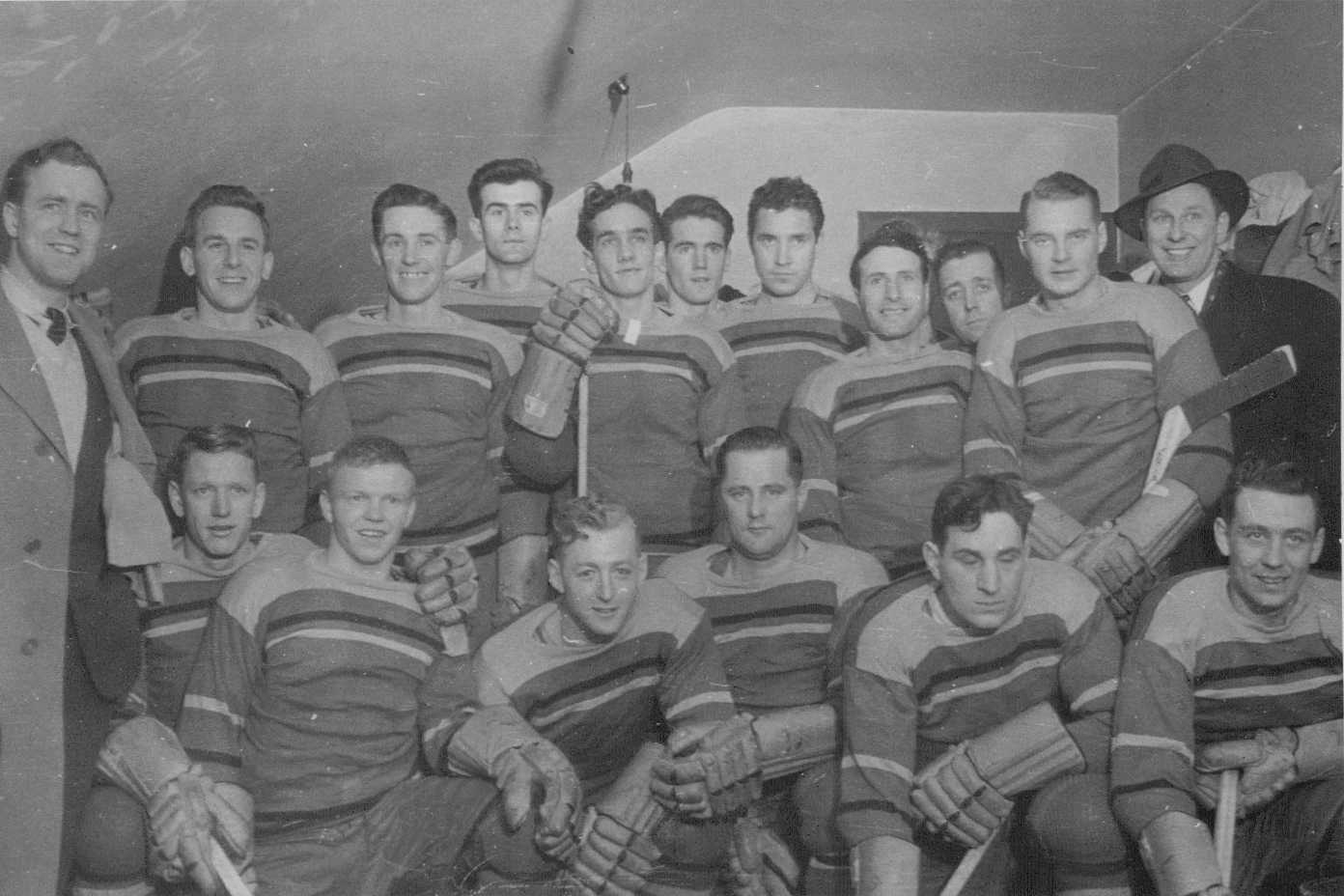
|
![]() Next day's (page 15 Dec 30. 1947) Ottawa Citizen heralded
Ref: 8.11
:
Next day's (page 15 Dec 30. 1947) Ottawa Citizen heralded
Ref: 8.11
:
Will Pare Olympic Hockey Team Tonight
Three Newcomers Impress At Workout
by Jack Koffman
With only 10 days remaining before they sail from New York........things are starting to hum in the camp of Canada's Olympic hockey forces.
Three athletes joined the RCAF sextet for practice and Sqdn. Ldr. Sandy Watson announced that personnel to represent Canada at the Olympics
will be made public following tomorrow's workout. Twenty–two players were at the practice yesterday with Selection Coach George
"Buck" Boucher and his son, Manager Frank Boucher, in charge. To cut the roster to 17 for the Olympic trip means paring five from
the squad but Manager Watson eliminated two of the candidates yesterday. ........
In the meantime, Manager Watson stated that the Olympic team will be kept busy once they hit the Old Country. They will sail from New York on
Friday, Jan. 9th and once they hit London, will play two or three games in Wembley Stadium. From there, they head for Paris and a
couple of games and then they will practice for a few days at Davos, Switzerland, before moving to St. Moritz.
The complete Canadian Olympic party will number 20. In addition to the 17 players, there will be Manager Watson, Coach Frank Boucher and Trainer
George McFaul.
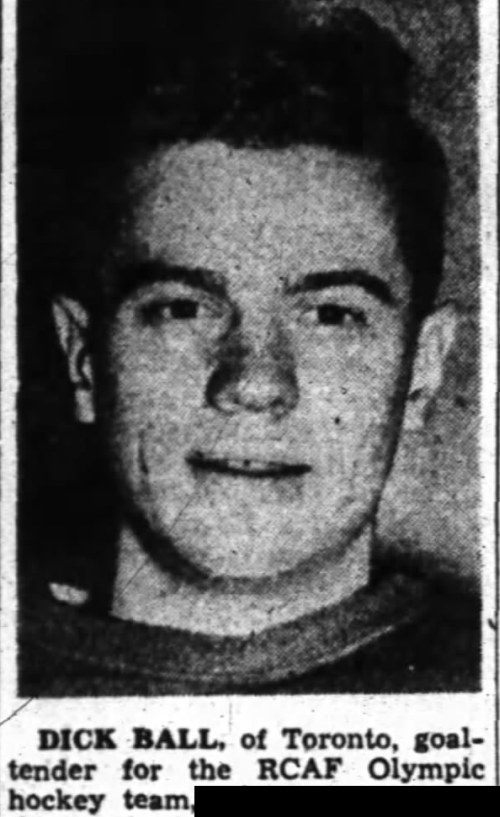
December 30, 1947 Scrimmage With Ottawa Senators
Buck Boucher made his Ottawa Senators available for a scrimmage game on the 30th. Although there was no hard hitting neither team fooled around and the play was hard fought.
We were defeated 10-4 in a 50-minute game our team clearly was much better. Dick Ball, a 3rd year Arts student at Toronto who played with the Varsity squad joined the Flyers that day and was steady in goal.
| PREVIOUS PAGE | GO TO TOP OF PAGE FOR INTER- and INTRA- CHAPTER NAVIGATION MENUS |
NEXT PAGE |
The Life and Times of Hubert Brooks M.C. C.D.